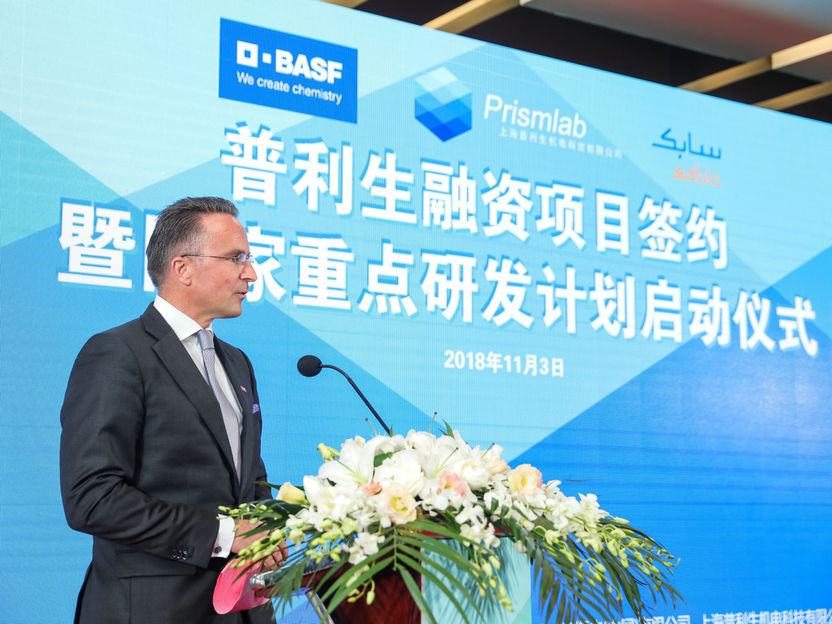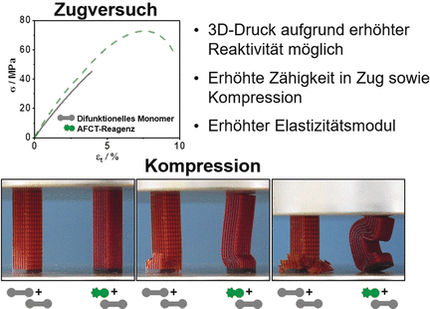BASF invests in Chinese 3D printing specialist
First direct investment by BASF Venture Capital in a company in China
BASF venture capital GmbH is investing in Prismlab, a leading provider of 3D printing processes and 3D printers, headquartered in Shanghai, China. Prismlab has developed a patented printing process that is characterized by a very high printing speed, high level of precision and lower printing costs. BASF’s venture investment will enable Prismlab to further accelerate its product development and innovation while strengthening its market reach to the global market.

Markus Solibieda, Managing Director of BASF Venture Capital GmbH at the signing ceremony.
BASF SE
“This is our first direct investment in a Chinese company,” said Markus Solibieda, Managing Director of BASF Venture Capital GmbH. “The trailblazing technology from Prismlab allows large and stable components, such as medical braces and anatomical models, to be 3D printed for the first time. This investment supports BASF’s strategy of actively advancing our technologies and expanding our product offering in the 3D printing sector.”
“China is transforming from a manufacturing-driven to an innovation-driven economy. This investment in Prismlab reflects our commitment to further expanding our innovation capabilities in China, and BASF Venture Capital plays an important role in helping us identifying potential partners that lead us to success,” said Dr. Zheng Daqing, BASF’s Senior Vice President, Business and Market Development Greater China.
“The 3D printing technology must continue to evolve before it is set to change the world. At Prismlab, we aim to spearhead and accelerate that change by providing solutions through specialized customization. The investment allows us to stay laser-focused on our R&D capability, a key factor to achieve that goal,” said Mr. Hou Feng, Founder and Chairman of Prismlab.
Prismlab has developed a patented 3D printing process, “Pixel Resolution Enhanced Technology”, based on stereolithography (SLA). SLA allows comparatively large components to be produced using light-curing resins. Prismlab’s technology increases the printing resolution without compromising printing speed. In order to increase the amount of energy brought into a pixel, Prismlab’s technology divides each pixel in the resin into several small sections, which can be cured individually by exposure to LCD light. This makes the energy input into each pixel significantly higher than similar processes that expose each pixel to light once. This allows comparatively large and stable components or numerous parts to be printed in the same production step. With the use of LCD light, it also reduces process costs. This advantage opens opportunities in the footwear and furniture industry.
Along with this patented process, Prismlab also markets 3D printers and other related services. The Prismlab technology can be used in various key customer applications, including invisible braces, and anatomical models for medical, and education and training purposes.
SLA uses a laser for layer-by-layer curing of a photopolymer solution to shape the required workpiece. SLA and LCD based printing processes determinate the size, stability, and usability of the components to be produced as they are limited by the size of the light spot and the intensity of the light.
Other news from the department business & finance

Get the chemical industry in your inbox
By submitting this form you agree that LUMITOS AG will send you the newsletter(s) selected above by email. Your data will not be passed on to third parties. Your data will be stored and processed in accordance with our data protection regulations. LUMITOS may contact you by email for the purpose of advertising or market and opinion surveys. You can revoke your consent at any time without giving reasons to LUMITOS AG, Ernst-Augustin-Str. 2, 12489 Berlin, Germany or by e-mail at revoke@lumitos.com with effect for the future. In addition, each email contains a link to unsubscribe from the corresponding newsletter.
Most read news
More news from our other portals
Last viewed contents

Rudolph Logic Systems GmbH - Sarstedt, Germany

Challenging counterfeit products with rare earths - New marking technique could halt product piracy
Merck KGaA and Nano-Terra Announce Extension of Nanotechnology Solutions Alliance

























































